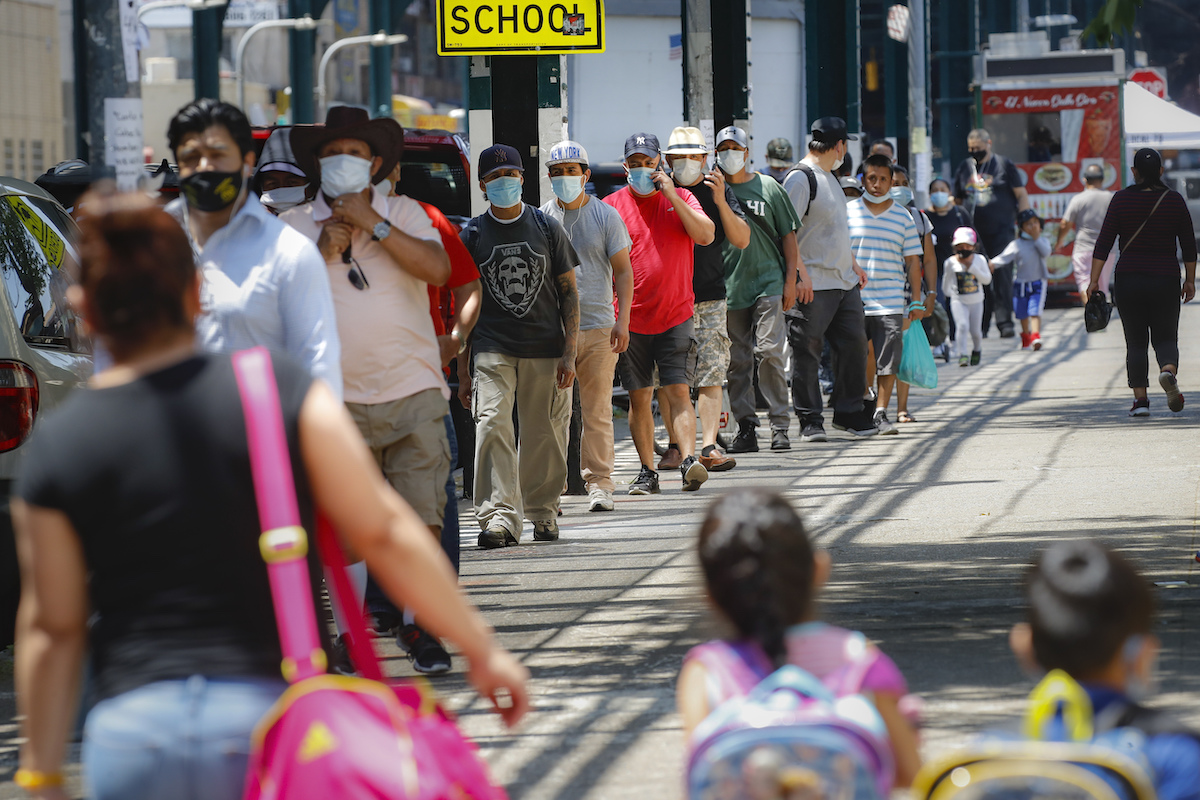

Pedestrians wearing protective masks wait in line for food donations during the COVID-19 pandemic, Tuesday, June 23, 2020, in the Corona neighborhood of the Queens borough of New York. (AP Photo/John Minchillo)
Despite being one of the groups hardest hit by the pandemic, Latinos in the United States are optimistic about the direction of the country, according to a study released on Thursday by the Pew Research Center.
“About half (49%) say they are satisfied with the nation’s direction, up from June 2020, when 20% said the same. This is the most satisfied Latinos have been with the nation’s direction since 2012, when 51% said so,” the Pew report noted.
The positive perception of Latinos who identify with the Democratic Party also increased. The view that things in the country could get worse fell from 47% in December 2019 to 25% in March 2021. Meanwhile, Latinos who identify as Republicans said things have gotten worse in the past year by 30%, up from 26% in 2019.
This optimism comes after U.S. Latinos were also among those who experienced the most job losses and COVID-19 infections. The survey found that 54% of Latinos who had to work away from home during the peak of the pandemic experienced job loss, compared to 35% who were able to continue working from home.
“Hispanics living in households where someone has lost a job or wages are more than twice as likely to say they have had trouble paying bills than those in households without a job or wage loss (51% vs. 20%),” the Pew report said.
While U.S. Latinos were experiencing these economic problems, they also faced becoming infected or losing family members due to COVID-19. The report noted that about half (52%) of U.S. Latino adults had a family member or close friend living in the U.S. or in another country who was hospitalized or died from COVID-19.
Fifty-six percent of Latino immigrants said a family member or close relative had been hospitalized or died from the virus, compared with 48% of those who are U.S.-born.
Child Care and Schooling
For Latino parents who had to work outside the home, caring for their children under the age of 12 was considered difficult (71%) compared to those who were able to work at home (55%).
“A majority of Latino parents with younger children say they’ve had a harder time with childcare during the pandemic. And this is true among mothers and fathers. However, mothers are more likely than fathers to say it’s been very difficult handling childcare duties. And work arrangements may play a role in this. Latino parents are more likely than the U.S. public to say their children have received online instruction rather than in-person instruction”, Pew senior writer and editor Jens Manuel Krogstad told Latino Rebels.
Only 10% of parents of K-12 students surveyed said they are not “concerned at all” about their children falling behind because of online education. Meanwhile, 42% said they are very concerned that their children are not keeping up with their classes.
That concern increased to 46% when focused on Latino immigrant parents, compared to 34% of U.S.-born Latino parents.
Support networks among family, friends and neighbors were key for U.S. Latinos to survive the crisis.
A majority (58%) say they have helped relatives or close friends in several ways—by delivering groceries, running errands or caring for their children (39%), sending or loaning money to family or friends in another country (28%), or sending or loaning money to family or friends in the U.S. (26%),” the report said.
The data collection field period for this survey was March 15 to March 28, 2021. It surveyed 3,375 U.S. Latino adults. The margin of error for the full sample of respondents is +/-2.8 percentage points.
***
Juanita Ramos Ardila is a Colombian journalist who has written for El Tiempo and ColPrensa. An M.A. Journalism candidate at CUNY’s Newmark Graduate School of Journalism, Juanita is also Latino Rebels’ 2021 Summer Correspondent. Twitter: @JuanitaRamosA.


